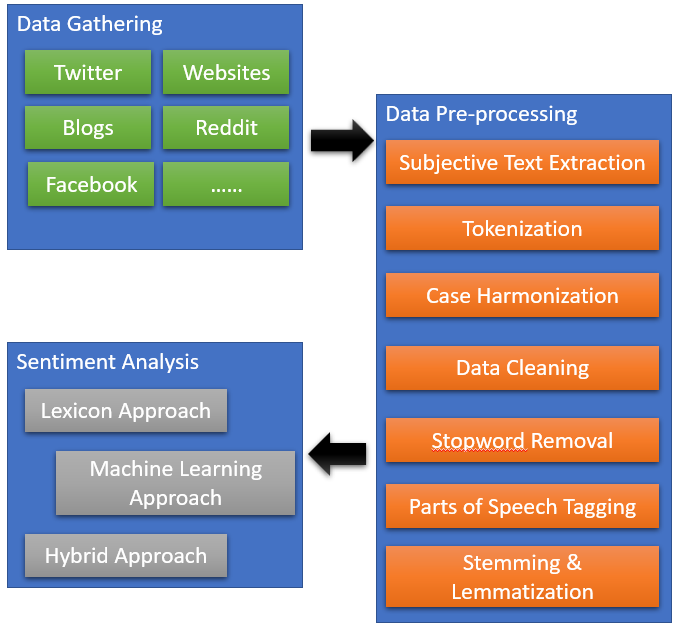Sentiment Analysis Framework and Its Application in Geopolitical Scenarios
Main Article Content
Abstract
Sentiment analysis or opinion mining involves systamtically extracting, identifying and quantifying subjective information using text analysis and natural language processing algorithms. The paper explores the recent research work in the field of sentiment analysis and categorizes the work into five unique domains. This paper proposes a three stage sentiment analysis framework involving the data gathering, data preparation and the sentiment analysis phases. The proposed framework is applied to the tweets on the Russia-Ukraine conflict in order to understand the current sentiment of the twitterati towards the conflict. The analysis was performed using lexicon based approach and machine learning based approach. The results of the analysis indicate that the machine learning approach provides better performance compared to lexicon based approach. Sentiment analysis also shows that there is still an overall negative sentiment towards the war.
Article Details
References
P. Wicke, and M. M. Bolognesi, “Covid-19 Discourse on Twitter: How the topics, sentiments, subjectivity, and figurative frames changed over time,” Front. Commun., vol. 6, pp. 1–20, March 2021, doi: 10.3389/fcomm.2021.651997
R. Chandra, and V. Kulkarni, “Semantic and sentiment analysis of selected Bhagavad Gita translations using BERT-based language framework,” IEEE Access, vol. 10, pp. 21291 - 21315, February 2022, doi: 10.1109/ACCESS.2022.3152266
E. Chen, and E. Ferrara, “Tweets in time of conflict: A public dataset tracking the twitter discourse on the war between Ukraine and Russia,” arXiv, March 2022, doi: 10.48550/arXiv.2203.07488
A. Shevtsov, C. Tzagkarakis, D. Antonakaki, P. Pratikakis, and S. Ioannidis, “Twitter dataset on the Russo-Ukrainian war,” arXiv, April 2022, doi:10.48550/arXiv.2204.08530
V. Bobichev, O. Kanishcheva, and O. Cherednichenko, “Sentiment Analysis in the Ukrainian and Russian news,” Proc. 2017 IEEE First Ukraine Conference on Electrical and Computer Engineering (UKRCON), pp. 1050-1055, May 2017, doi: 10.1109/UKRCON.2017.8100410
J. Wu, K. Lu, S. Su, and S. Wang, “Chinese micro-blog sentiment analysis based on multiple sentiment dictionaries and semantic rule sets,” IEEE Access, vol. 7, pp. 183924-183939, December 2019, doi: 10.1109/ACCESS.2019.2960655
W. Yin, and L. Shang, “ContextBert: Enhanced implicit sentiment analysis using implicit-sentiment-query attention,” Proc. 2022 International Joint Conference on Neural Networks (IJCNN), pp. 1-8, July 2022, doi: 10.1109/IJCNN55064.2022.9892878
E. Lee, F. Rustam, I. Ashraf, P. B. Washington, M. Narra, and R. Shafique, “Inquest of current situation in Afghanistan under Taliban rule using sentiment analysis and volume analysis,” IEEE Access, vol. 10, pp. 10333-10348, January 2022, doi: 10.1109/ACCESS.2022.3144659
Z. Li, R. Li, and G. Jin, “Sentiment analysis of Danmaku videos based on Naïve Bayes and sentiment dictionary,” IEEE Access, vol. 8, pp. 75073-75084, April 2020, doi: 10.1109/ACCESS.2020.2986582
Saini, D. J. B. ., & Qureshi, D. I. . (2021). Feature Extraction and Classification-Based Face Recognition Using Deep Learning Architectures. Research Journal of Computer Systems and Engineering, 2(1), 52:57. Retrieved from https://technicaljournals.org/RJCSE/index.php/journal/article/view/23
R. P. Kashti, and P. S. Prasad, “Enhancing NLP Techniques for Fake Review Detection,” International Research Journal of Engineering and Technology (IRJET), Vol. 06(02), pp. 241-245, February 2019
A. M. Elmogy, U. Tariq , A. Ibrahim, and A. Mohammed, “Fake Reviews Detection using Supervised Machine Learning,” International Journal of Advanced Computer Science and Applications, Vol. 12(1), pp. 601-606, January 2021, doi: 10.14569/IJACSA.2021.0120169
X. Fang, and J. Zhan, “Sentiment analysis using product review data,” Journal of Big Data, Vol 2(5), June 2015, doi: 10.1186/s40537-015-0015-2
H. Jelodar , Y. Wang , R. Orji, and S.Huang, “Deep Sentiment Classification and Topic Discovery on Novel Coronavirus or COVID-19 Online Discussions: NLP Using LSTM Recurrent Neural Network Approach”, IEEE Journal of Biomedical and Health Informatics, Vol. 24(10), pp. 2733-2742, October 2020
S. T. Lai and R. Mafas, "Sentiment Analysis in Healthcare: Motives, Challenges & Opportunities pertaining to Machine Learning," 2022 IEEE International Conference on Distributed Computing and Electrical Circuits and Electronics (ICDCECE), Ballari, India, pp. 1-4, 2022, doi: 10.1109/ICDCECE53908.2022.9792766
Raj, G. ., Verma, A. ., Dalal, P. ., Shukla, A. K. ., & Garg, P. . (2023). Performance Comparison of Several LPWAN Technologies for Energy Constrained IOT Network. International Journal of Intelligent Systems and Applications in Engineering, 11(1s), 150–158. Retrieved from https://ijisae.org/index.php/IJISAE/article/view/2487
N. A. M. Razali et al., "Political Security Threat Prediction Framework Using Hybrid Lexicon-Based Approach and Machine Learning Technique," in IEEE Access, vol. 11, pp. 17151-17164, 2023, doi: 10.1109/ACCESS.2023.3246162
Y. Dai, Z. Wu and H. Zhang, "Sentiment Analysis of Comment Texts Based on CNN-BiGRU-Attention," 2021 China Automation Congress (CAC), Beijing, China, 2021, pp. 2749-2754, doi: 10.1109/CAC53003.2021.9728140
V. Shumovskaia, M. Kayaalp, M. Cemri and A. H. Sayed, "Discovering Influencers in Opinion Formation Over Social Graphs," in IEEE Open Journal of Signal Processing, vol. 4, pp. 188-207, 2023, doi: 10.1109/OJSP.2023.3261132
Pekka Koskinen, Pieter van der Meer, Michael Steiner, Thomas Keller, Marco Bianchi. Automated Feedback Systems for Programming Assignments using Machine Learning. Kuwait Journal of Machine Learning, 2(2). Retrieved from http://kuwaitjournals.com/index.php/kjml/article/view/190
H. Xu, X. Xiao, M. Xu and B. Wang, "How Does Persuasion Happen? A Novel Bounded Confidence Opinion Dynamics Model Based on Social Judgment Theory," in IEEE Systems Journal, vol. 17, no. 1, pp. 708-719, March 2023, doi: 10.1109/JSYST.2022.3205724
Muhammad Rahman, Automated Machine Learning for Model Selection and Hyperparameter Optimization , Machine Learning Applications Conference Proceedings, Vol 2 2022.
V. R. Sekar, T. K. R. Kannan, S. N and P. Vijay, "Hybrid Perception Analysis of World Leaders in Reddit using Sentiment Analysis," 2023 International Conference on Advances in Intelligent Computing and Applications (AICAPS), Kochi, India, pp. 1-5, 2023, doi: 10.1109/AICAPS57044.2023.10074005
L. Rong, Z. Weibai and H. Debo, "Sentiment Analysis of Ecommerce Product Review Data Based on Deep Learning," 2021 IEEE 4th Advanced Information Management, Communicates, Electronic and Automation Control Conference (IMCEC), Chongqing, China, 2021, pp. 65-68, doi: 10.1109/IMCEC51613.2021.9482223.
Humanities Britannica, https://www.britannica.com/topic/humanities

